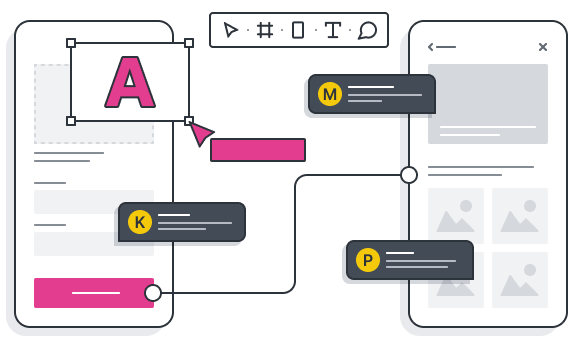Online learning has many benefits – convenience and the ability to fit study around your own personal schedule being two of the most compelling. However, eLearning is not without its fair share of challenges. Self-discipline, excellent time management skills and a decent level of self-motivation are just some of the qualities an independent eLearner will need to succeed.
In this article, we share some of our best study tips to help ease you into online learning and offer ways of supporting yourself to achieve your educational goals.
1. Consider online learning practices and what will be expected of you
The first thing you need to realise once you’ve decided to study for an academic qualification online, is that just because it’s online and doesn’t adhere to a very strict schedule, doesn’t necessarily mean it will be easier or require less study or hard work. More often than not, it just means that it will be more convenient.
Just as with any traditional in-person course, you’ll still need to dedicate a significant portion of your time to studying, you’ll need to work on and submit coursework and assignments, and you’ll need to consistently follow the programme in lieu of physical attendance.
With these considerations in mind, our first tip for successful online study is to take stock of your particular course’s requirements. How long is the course? How often and when do you need to submit coursework or projects? Are there deadlines of which you need to adhere? Do you need to virtually attend any livestream webinars? Do you have a virtual tutor? If so, do you need to keep in contact with him/her with regular check-ins? The list goes on.
When you have a better idea of what is expected of you, you’ll be able to manage your time and priorities accordingly.
2. Establish your key goals and objectives
Once you’ve enrolled in your course, before diving in it’s a good idea to review the outline of your syllabus, modules and any other relevant materials to get a good idea of what’s ahead of you.
Roughly how much time needs to be dedicated to each section/module? How many assignments will you be required to submit? How many hours of video will you need to watch? How much reading material is there to get through? Are there any exams or quizzes that you’ll need to study for?
At the very least, your course outline should indicate to you the minimum amount of time you should set aside each week to study. Use the course’s outline and learning objectives as a roadmap to identify your own personal learning goals, all the while considering what you ultimately want to accomplish upon graduation.
3. Make a study plan and stick to it
Steps 1 and 2 completed, now is a great time to make a study plan and do your level best to stick with it.
Just how detailed your plan needs to be is totally up to you but it should be realistic and reflective of your capabilities and time allowances. After all, there’s no point doing up a meticulously detailed plan that takes into account every minute of the day if you know that you’ll never be able to stick to it!
Again, use the course’s recommended minimum study hours as a guide and try to slot your study in around practical times of your regular working week. The more routine you can make it the better; with regular time slots blocked off, the more likely you are to stick to the plan. Finding self-discipline to study can be difficult, so make it as easy as possible for yourself.
Dos:
- Set time limits for each task.
- Take regular study breaks. We recommend a 10 minute break for every 50 minutes of study.
- Make to-do lists to check off at the end of each week.
Don’ts:
- Procrastinate!
- Be too generous with your study breaks. It shouldn’t be 10 minutes on and 50 minutes off!
- Throw in the towel if your plan fails at any point. If you’re finding it very difficult to stick to your plan for whatever reason, take some time to reflect and revise it accordingly. You can do this!
4. Find a distraction-free dedicated study space
Whether you’re studying at home, at the office, in the library or at a café, try to find somewhere as distraction-free as possible. What is most likely to distract you will be particular to each individual. It could be a family member interrupting you for a chat; the siren of social media calling out to take you away from your focus; or something as simple as a noisy environment.
Most of these common distractions are easily avoidable. If you’re at home, ask your family/housemates to respect that you’re in study mode and not free to talk during certain hours of the day. Switch off your phone or put it on airplane mode. If you can’t get to a quiet space, stick in some headphones and select some soothing, study conducive music to block out any intrusive hum.
And if there are just too many tempting distractions online, there are plenty of apps you can install that block certain websites for you, so that you won’t be tempted to check Facebook/YouTube/Twitter or whatever your vice is every two minutes!
5. Join online communities
One of the lesser talked about challenges of online learning is its solitary nature. As you won’t be going to a physical classroom or lecture hall every day, you won’t have the opportunity to chat with your fellow students about the ups and downs of your course load. Classroom camaraderie can be hard to replicate elsewhere, as no one who isn’t trying to tackle the same tasks as you is going to ‘get it’ to quite the same degree.
To get over this hurdle, first make sure that there aren’t any online student support groups associated with your course. You might find that you can connect with your virtual classmates through webinars or student chat rooms hosted on your course’s website for example.
Failing this, there are doubtlessly many online communities across the web that cater to questions within your chosen field of study. Quora, YouTube and Reddit are great resources to get started on. You might even try reaching out to professionals in your field you admire on LinkedIn for advice and potentially, mentorship.
6. If you need help, ask for it!
Just because you’re learning independently online, it doesn’t mean you have to leave yourself in the dark if you run into any problems. Make the most of the resources that your course offers. Don’t feel afraid to reach out to your course mentor/tutor/support staff if you’re feeling lost. After all, that’s what they’re there for!
7. Find little ways to stay motivated
Sometimes online learners run into difficulties when it comes to self-motivation – especially with longer term courses.
We’ve found that one of the best ways to stay on track and keep your energy levels up is to celebrate the milestones. From something as simple as finishing reading a chapter to big goals like submitting a hefty project – don’t be shy about acknowledging your achievements. Pop some champagne, have a party with friends or just punch the air – whatever makes you feel accomplished – do it!
Another way to keep going is to make yourself and your progress accountable to someone else. Whether that’s a friend, a fellow student or your social media following – regularly updating someone who supports you on your progress will help you stay motivated, energised and on top of things.
8. Exams: Don’t fall at the last hurdle!
If you follow tips 1 to 7, you’ll be well on your way to success with your online qualification. The last tip we have for you is really a classic of any kind of learning, online or otherwise. When you’re coming up to exam time (that is, if your course includes one) stick to the three Rs; Review, Revise, Repeat.
Make an exam study plan similar to the one you made to complete the course. Methodically set your objectives and goals to give yourself the best chance at success.
As we said in the very first tip, studying for an online exam isn’t going to be any easier than studying for a traditional exam – it will just be more convenient. However, having said this, convenience really comes into its own here. For example, if you’re taking a video-heavy course, you can easily revise by rewatching your lectures as many times as needed, meaning that you don’t have to rely so heavily on your own notes.
Did we miss anything?
Have you got any top study tips for online learners that you swear by that we missed? Let us know in the comments or tweet us @uxdihq. We’d love to hear from you.
One more thing…
Did you know you can study online with the UX Design Institute and become a certified UX professional in just 6 months? Find out more.





